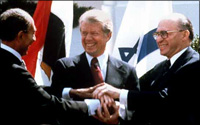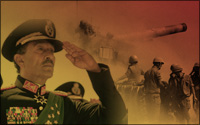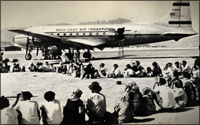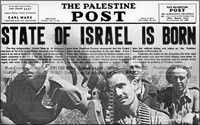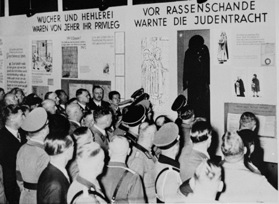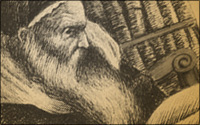 The thirteenth century in Spain is marked by the Reconquest of Spain by the Christians. The Crusades in Europe forced an entire evaluation of the relationship between the Muslims and Christians. The Christians, especially the popes, could not tolerate a Muslim foothold in what they considered to be Christian land. Because of that they began a century-long war that would culminate in the Muslims being driven out of Spain and it becoming a completely Catholic country.
The thirteenth century in Spain is marked by the Reconquest of Spain by the Christians. The Crusades in Europe forced an entire evaluation of the relationship between the Muslims and Christians. The Christians, especially the popes, could not tolerate a Muslim foothold in what they considered to be Christian land. Because of that they began a century-long war that would culminate in the Muslims being driven out of Spain and it becoming a completely Catholic country.
This would naturally have very sad consequences for the Jews, because they would lose their privileged position in society and become a persecuted minority. In the thirteenth and fourteenth centuries, as Christianity experienced more and more problems, they focused more and more on the Jews, and caused the Jews to suffer hideously in Spain and throughout Europe.
This is the backdrop for the understanding one of the great men of Spanish Jewry, Rabbi Moses ben Nachman, Nachmanides.
The Great Conciliator
Rabbi Moses ben Nachman was born in Gerona, Spain. He would become the leader of Spanish Jewry after the death of Maimonides. Maimonides was a controversial figure during his lifetime and in the century following his passing. Not everyone was willing to accept his philosophy, books and authority.
His opposition sent itinerant preachers to Jewish communities, speaking in the synagogues saying that Maimonides’ works should be banned. We know that zealotry begets zealotry. Even if the war is led by great people it is joined by less than great people who behave in a reprehensible fashion. In year 1240, and continuing at times until almost 1250, some of these Jewish extremists burned the books of Maimonides.
When we today hear about the burning of books, we have the picture in our minds of the Nazis burning Jewish books in Germany, and later in Poland and Russia. In the Middle Ages book burning was common. Not only did they burn books, they burned people – and for the same reason. In Christian Europe, the penalty for having thoughts or ideas that did not conform to official Church dogma was to be burned at the stake. Many times the heretical book was part of the fuel that fed the fire which burned the heretic.
The king of France, Louis IX, who would be canonized and become St. Louis, forced the Jewish communities of France to give up their copies of the Talmud – not just the books of Maimonides — and in 1250 CE had them burned in the square in front of the Louvre in Paris. In so doing, he effectively closed all of the Jewish schools of learning in France.
His act was not lost upon the Jewish population. Many thought and said: it was measure for measure for burning the books of Maimonides. Once the fire is lit you will not be able to put it out. Rabbi Jonah of Gerona, who was one of the great speakers against Maimonides, felt overcome by remorse and visited again all the communities where he had spoken, preaching against Maimonides, and now told them he was wrong. He then wrote what would quickly become one of the classic books of Jewish ethics, “The Gates of Repentance.” The entire book is devoted to how a person can rectify spiritual and moral mistakes. The catalyst for the book was this event.
As for Nachmanides, even though he disagreed with much of what Maimonides wrote – he was not at all from the rationalist philosophy or Aristotelian camp – he defended Maimonides against all accusations. He refused to condone any of the statements or acrimonious behavior against Maimonides. It was Nachmanides, more than anyone else, who stopped the in-fighting. His great ability to serve as a conciliator – being able to argue against an idea and not a person – saved the day. By 1270-80 CE the terrible acrimony between Jews either for or against Maimonides would become consigned to the history books alone and never occur again in that fashion.
Publishing of the Zohar
In the early thirteenth century, a Spanish Jew by the name of Moses de Leon published a book that was called the Zohar. He claimed that this book was authored by the great Tanna, Rabbi Shimon ben Yochai (also Simon son of Yohai or “Rashbi,” the Hebrew acronym for Rabbi Shimon bar Yochai), who lived over 1,000 years earlier, in the second century of the Common Era. The book had been kept secret all that time, Moses de Leon said.
The Zohar is the basic book of Kabbalah, of what we loosely translate as “Jewish mysticism.” Kabbalah is not about spooks and goblins, but seeing the world on a completely different plane than we are accustomed to and which in many ways contradicts normal life.
The emergence of the Zohar brought about an immediate dispute. There were those who did not have a high regard for Mose de Leon. They did not trust the veracity of his claim and declared that he wrote the book himself. Traditional Jewry is strongly of the opinion that the book comes from the time of the Mishnah and Rabbi Shimon ben Yochai, who the Talmud says had to hide in a cave from the Romans for 13 years. The Zohar says that during this time he and his son, who hid with him, composed the contents of the Zohar.
Nachmanides is the first accepted, great rabbinic scholar to legitimize the use of Kabbalah, and he did so in his monumental commentary to the Bible. Many times, after citing other rabbinic opinions, he writes, “And the ultimate truth is,” by which he means according to Kabbalah. Then he provides Kabbalistic interpretations to the Bible.
Due to his great stature, that was accepted and acceptable. It set a pattern. Many subsequent commentaries are Kabbalistic in nature and orientation. Nachmanides was the first, however. He is the one that made it acceptable. Under the patronage of Nachmanides, Kabbalah entered Jewish life and remains there until our very day, albeit not without its controversies.
The Great Debate
Perhaps the most dramatic event in his life was an event that would become known as the Great Debate. It is a watershed in Jewish history.
King James I of Aragon, one of the Christian kings, was a very devoted Roman Catholic. In his court was a Jew by the name of Pablo Christiani – who the Church called Friar Paul – who had converted to Roman Catholicism. He came to the king with a tremendous proposal. He said that he was a Hebrew scholar (the king was barely literate) and that he would be able to prove from the Hebrew Bible and Talmud the truth of Christianity and the falsehood of Judaism. Furthermore, he could prove it to the greatest rabbi of the time, Rabbi Moses ben Nachman.
The king thought if he could convince the greatest rabbi of the veracity of Christianity the rest of the Jews would follow and he would have his ticket to heaven, indeed a front row seat.
Not only did he authorize a debate, but in history this debate marked the beginning of a series of debates – that would last about three centuries — in medieval Europe. This is the only debate that the Jews won…because it was the only debate that was fair. After this debate, which Nachmanides will win so convincingly that even the king will have to agree, the rules of the debates changed; they were never again fair. That is why such debates were always disastrous for the Jews and Jews avoided such debates where they could. They learned that being invited to a debate was like being invited to a pogrom.
Nevertheless, this first debate was fair. It took place in Barcelona in 1267 CE the week before Shavous, the Jewish holiday commemorating the day that the Torah was given on Mount Sinai. We have an exact record of the debate kept by Nachmanides himself. Every night after each day’s debate, he wrote down what he said and what Pablo Christiani said.
Nachmanides asked the king permission to speak freely. In those days, no one was allowed to say anything contrary to Christian doctrine. The cardinals and other Church officials said it would be blasphemy. However, the king concluded that it would only be fair if he was able to say what he wanted to say and guaranteed Nachmanides protection no matter what he said. That is why this is the only debate in medieval times that was fair.
Nachmanides said some very strong things. He said, for instance, that the Christian founder came into the world as the “Prince of Peace,” but more blood had been spilled by Christians that anybody else in the history of humanity. Their founder came on behalf of the poor, but no one had exploited the poor more than the Church.
There has never been such a combination of intellectual and emotional dismemberment of a person, Pablo Christiani. At its end, the king awarded the victory to Nachmanides and even gave him a donation of 300 gold coins for his academy.
On that very Shavuot, Nachmanides held a sermon in the great synagogue in Barcelona. In it he restated to the Jewish audience the positive side of the debate, i.e. not what is wrong with Christianity but what it meant to be the people of the Torah. However, the Church could not suffer such a defeat without taking vengeance. They claimed that although Nachmanides had been granted permission to speak freely at the debate he had no permission to do so at his synagogue. Therefore, his sermon was deemed heresy. From that time on he was so hounded by the Church that he had to leave Spain.
He was 72 when he left Spain and headed for the Land of Israel. He eventually arrived in the city of Jerusalem, he writes, but could not find a quorum of Jews. Through the ravages of the Crusades and the Muslims he could not find 10 Jews in the Holy City.
He then headed toward the city of Nablus (biblical Shechem) and met two Jewish brothers and convinced them to come back with him to Jerusalem. Then he went to the city of Hebron, met other Jews and brought them back. Then, he writes, he saw a building in Jerusalem with four pillars and a dome and purchased it with his own money to become the synagogue, thereby reestablishing the Jewish community in Jerusalem.
That synagogue stood until 1948 when the Arabs blew it up. Today, however, the synagogue of Nachmanides has been rebuilt in the Jewish quarter of Jerusalem.
We have letters that he wrote home to his family. He writes about his homesickness for his family: his children and grandchildren. Nevertheless, he thanks God for allowing him to come to the Land of Israel and there to rebuild the community in Jerusalem. He writes that that is an opportunity that was given to few.
His Death and Burial
Nachmanides died in about 1270 CE. We do not know exactly where he is buried. Most scholars, in sync with Jewish tradition, say that he was buried near the city of Haifa.
Although it is not clear where his burial place is it is clear that he died and was buried in the Land of Israel. Furthermore, it is clear that his departure from Spain accelerated its decline and the coming of the persecution of the Jews in Spain. The Golden Era was now long behind them. In less than two centuries they would be expelled from Spain, marking the end of Spanish Jewry.

